Where have all the accountants gone?
Everyone knows there’s a shortage, but the reasons become clear after a look at the data.
The Federal Government’s skill shortage list indicates the last time there was a shortage of accountants in Australia was in 2008. Until recently, data shows there has consistently been enough accountants to meet the job vacancy need. In other words, it’s been an employer’s market.
In 2014, the Australian Financial Review wrote that accounting firms could ‘afford to be selective’ as it was ‘not hard to recruit in the current market.’
But fast forward to 2022 and most in the accounting industry will tell you there are ‘too many accounting jobs and too few accountants.’
This sentiment is backed up by the CBA’s Accounting Market Pulse Report which indicates at least 93 per cent of accounting firms consider finding quality staff a challenge.
So, where have all the accountants gone?
In researching this issue, the Benchmarking Group discovered three core reasons to explain the accountant shortage:
- The competition for skilled professionals[i] in Australia
- The lack of students studying accounting in Australia and globally
- The high reliance on migrant accountants in Australia
1. The competition for skilled professionals in Australia
Over the past 10 years, the accounting industry has seen an increase in jobs requiring university qualifications and a decrease in clerical and bookkeeping positions.
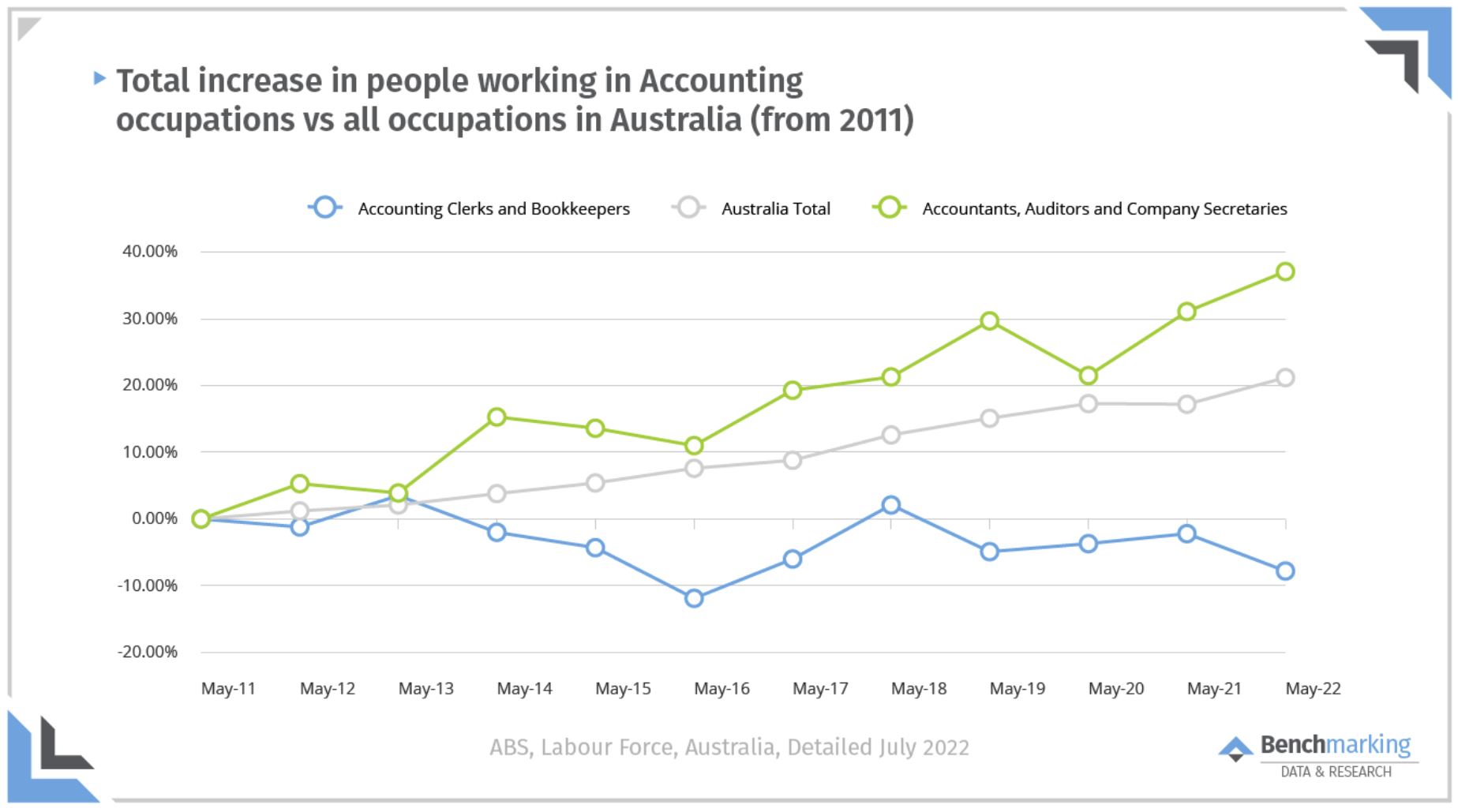
As shown in previous Benchmarking research, this is primarily due to the automation of accounting administration and ease of online bookkeeping software such as Xero and MYOB. This labour shift is not unique to the accounting industry; it’s consistent across all industries in Australia. As well as most developed economies.
In Australia, the number of vacancies for skilled professionals now outweighs the number of skilled professionals looking for work.
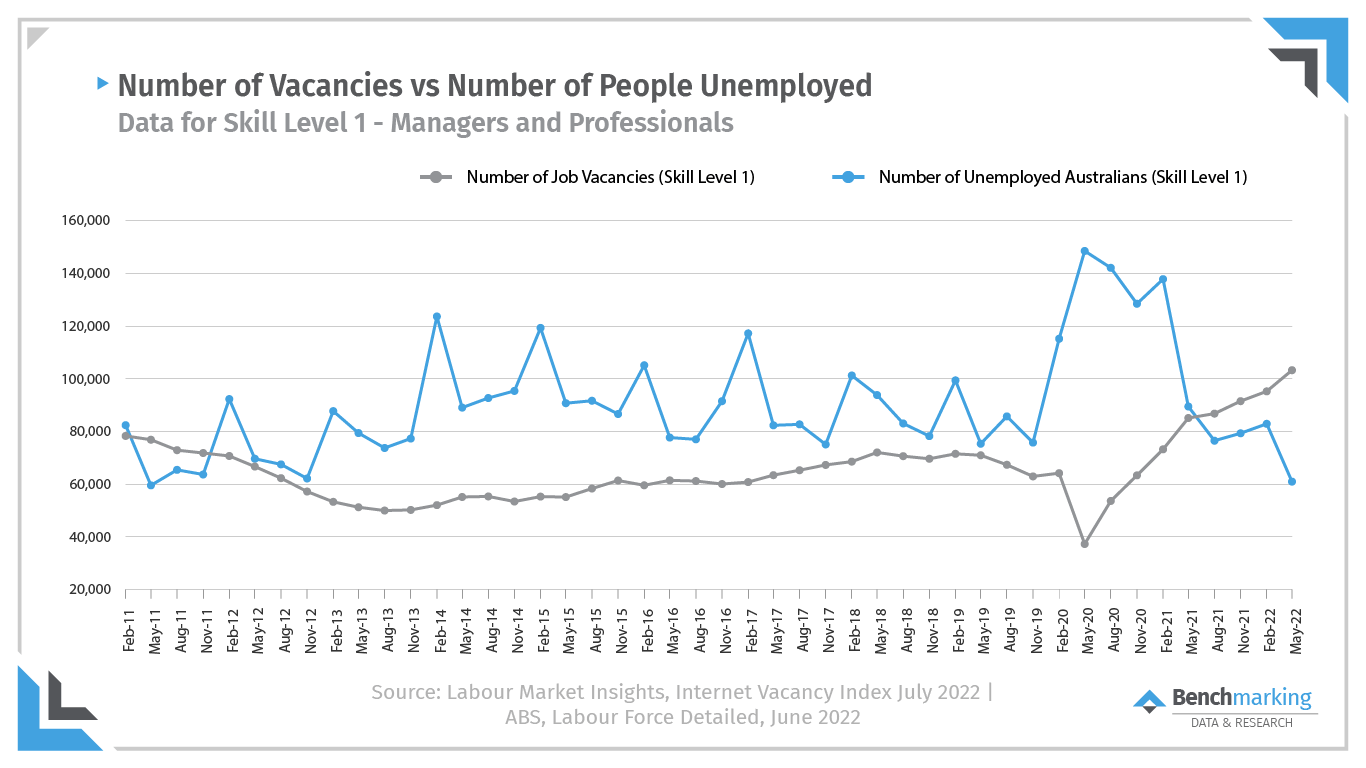
Thus, accounting firms are not only competing against other firms for skilled labour, but also against other industries.
Accountants have a unique set of skills that can transition into other general managerial and business advisory roles. However, the reverse is not always possible.
This is highlighted in a recent article stating that “Accountants may hold the key to addressing the skills shortage in financial planning.”
For some accountants, the move to other industries may be tempting. Especially when they could be earning (on average) approximately 82 per cent more weekly as a financial investment adviser and 71 per cent more as a general manager. (ABS, Employee Earnings and Hours)
2. The lack of students studying accounting in Australia and globally
The number of students studying accounting as a non-school qualification[ii] has steadily decreased over the past eight years. Not only has the number of actual students decreased but also the percentage of total students studying accounting.
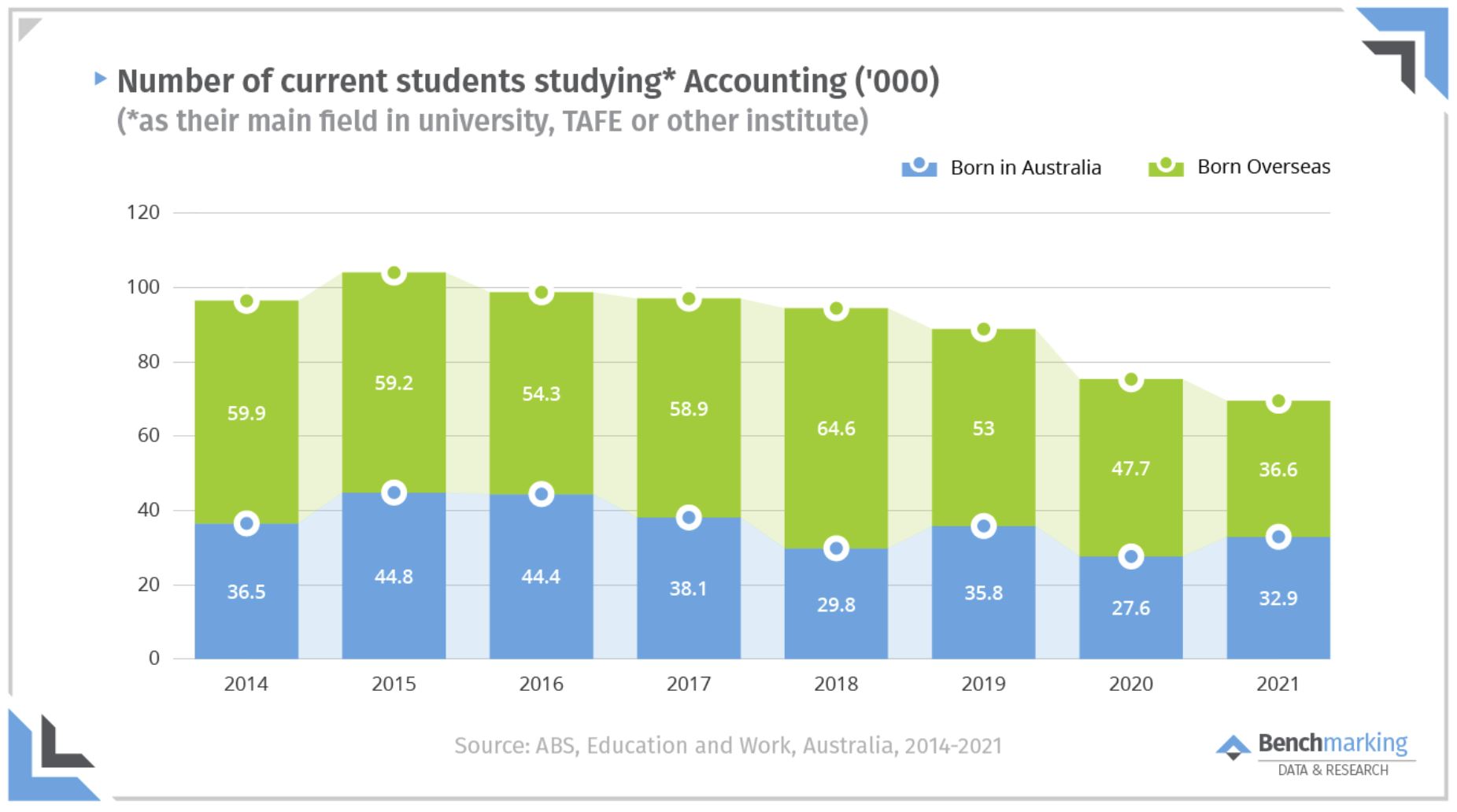
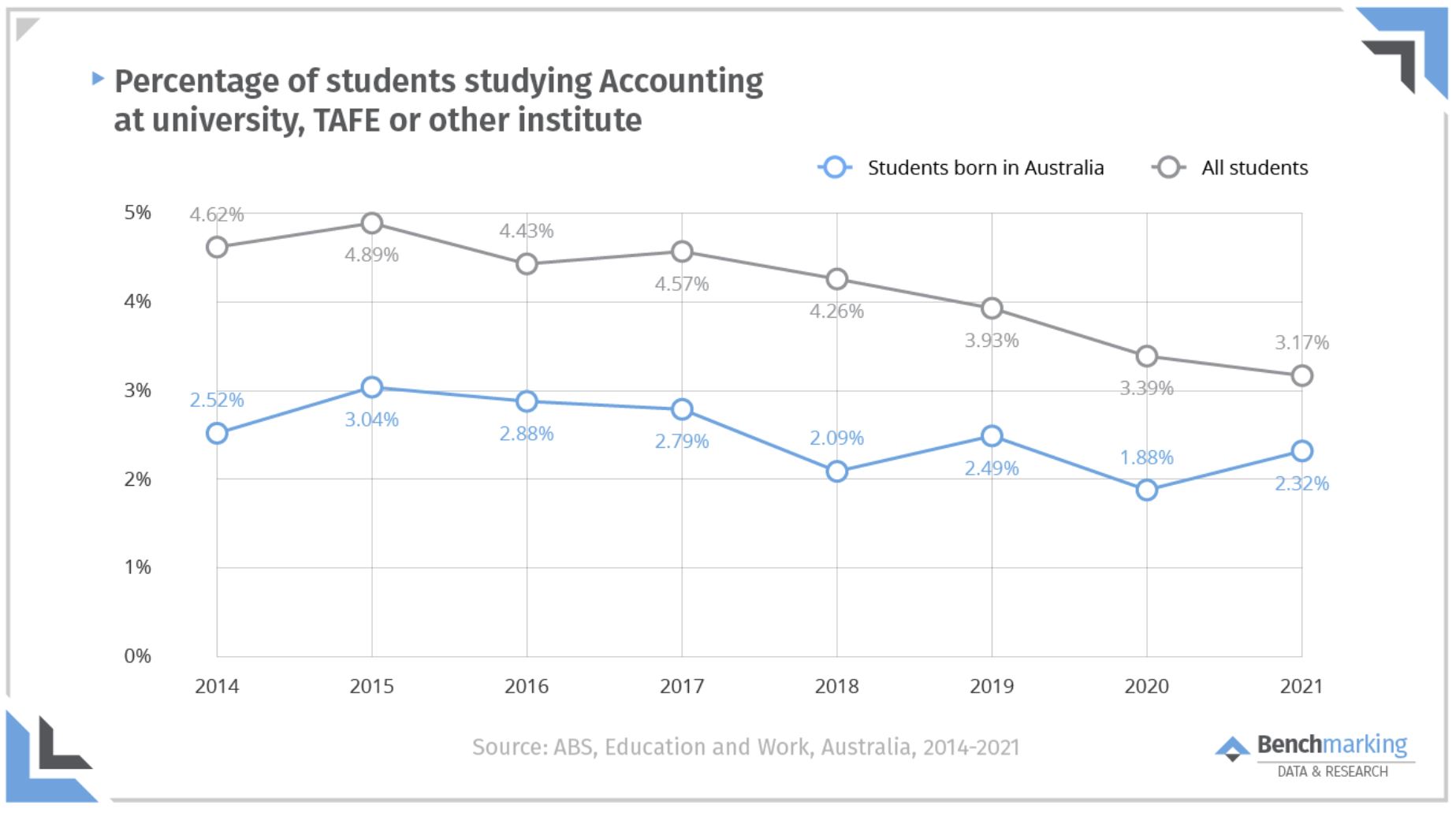
This is not an entirely new issue for the industry. In 2014, it was reported that the number of Australians studying accounting had fallen 20 per cent since 2001. Since 2014, the number of Australian students studying accounting had dropped a further 10 per cent.
The drop in accounting students is also occurring globally. The US has recorded a steady decline in students since a peak in 2012. Further, from 2019 to 2020 student numbers in UK and the Republic of Ireland decreased by 2.1 per cent and by 2.7 per cent worldwide.
Despite immigration being low into Australia, global shortages of students impact Australian firms as it creates more opportunities for Australian trained accountants to travel overseas.
A decrease in students reduces the pool of accountants globally, therefore heightening the competition for labour locally.
3. The high reliance on migrants within the industry in Australia
In Australia, there is a much higher number of migrants working as accountants compared to other industries. This has been supported by the government’s skilled migration program.
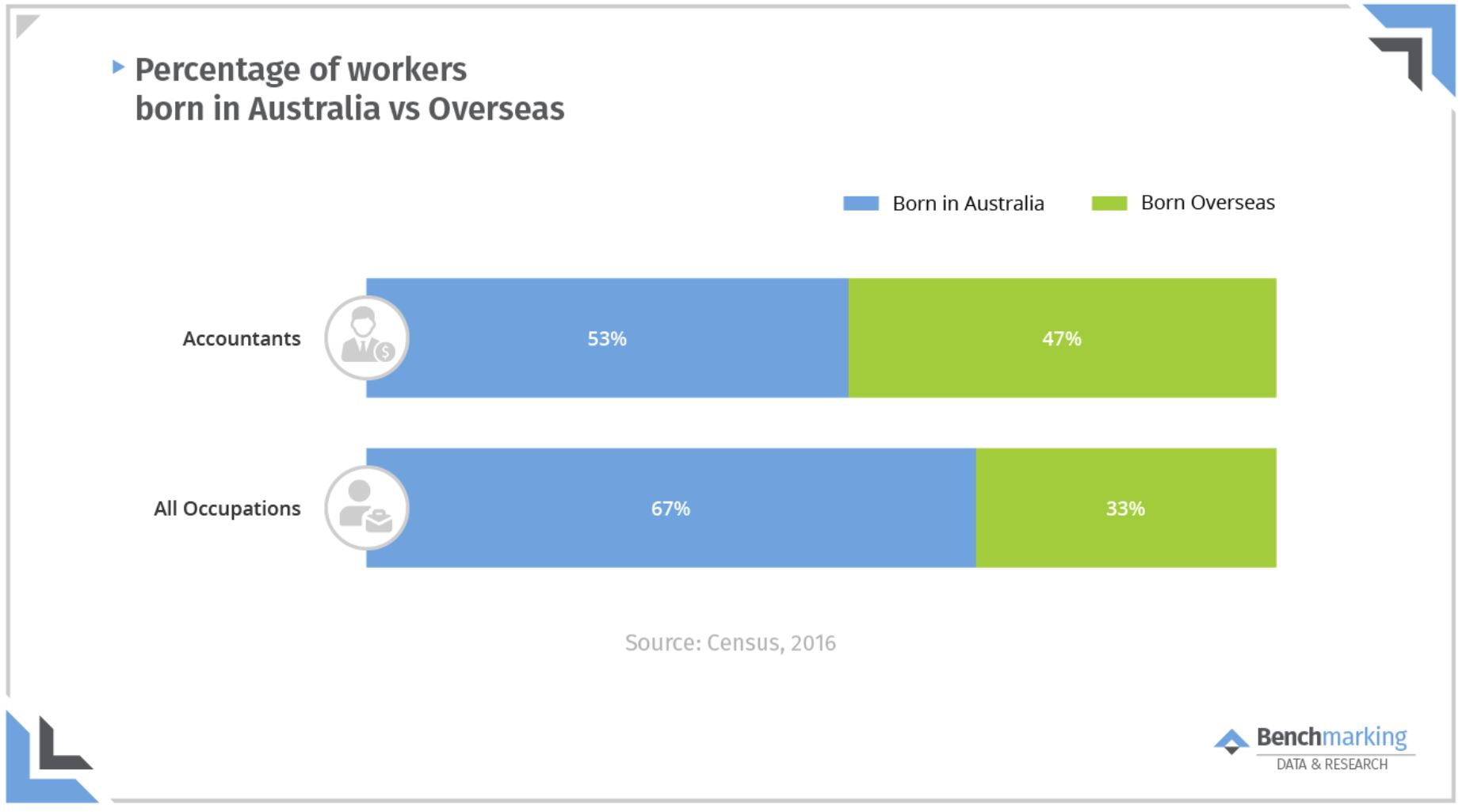
However, in 2020-21, immigration to Australia fell by 71 per cent. This undoubtedly reduced the number of skill accountants in the marketplace.
Whilst immigration to Australia has begun to increase, the industry is still feeling the impact of 18 months of negative net migration.
What can accounting firms do to address the current shortage in the short term?
Firms should expect the accountant shortage for the next 1-2 years. While putting in place appealing remuneration and workplace wellbeing programs can be beneficial, this is not the only option. Accounting firms can also think outside the box and put in place different strategies to ride the wave. This may include:
- Restructuring the firm to hire more non-accounting roles
While skilled professionals are in short supply, there are currently 1.39 unemployed clerical and administration workers for every advertised job. There may be opportunity for firms to add support roles to address labour shortages.
- Hire business advisers instead of accountants
Business advisers can be a complimentary service to accounting firms. Removing some of the advisory tasks from accountants can free up time for focus on specialist tax and accounting services.
- Improve firm productivity and efficiencies
Document automation and streamlining processes can dramatically increase a firm’s capacity. Firms can review systems to see where efficiencies can be gained.
What are the long-term solutions?
The reality is the accounting industry will always need skilled professionals. Further, the future demand for skilled professionals will continue to engulf the need for clerical and bookkeeping roles.
Hence, for the industry, attracting more people to study and train as accountants should be a priority. This includes both Australian-born and international students, as well as non-accounting professionals.
The long-term solution may lie in better industry wide workplace conditions, or in offering more diverse roles for junior accounts. Or perhaps the industry simply needs a rebrand.
No matter the solution, the industry must come together to determine how it can become more appealing so it can continue to thrive in future years.
Julia Thomson is head of data analytics and content at the Benchmarking Group.
[1] Note, in this report, skilled professionals are equivalent to the ANZSCO classification of Skill level 1: occupations that require a bachelor’s degree or higher (or at least five years of relevant experience).
[1] Non-school qualification includes a bachelor’s degree or higher, diploma, graduate certificate, or Certificate I, II, III or IV.
